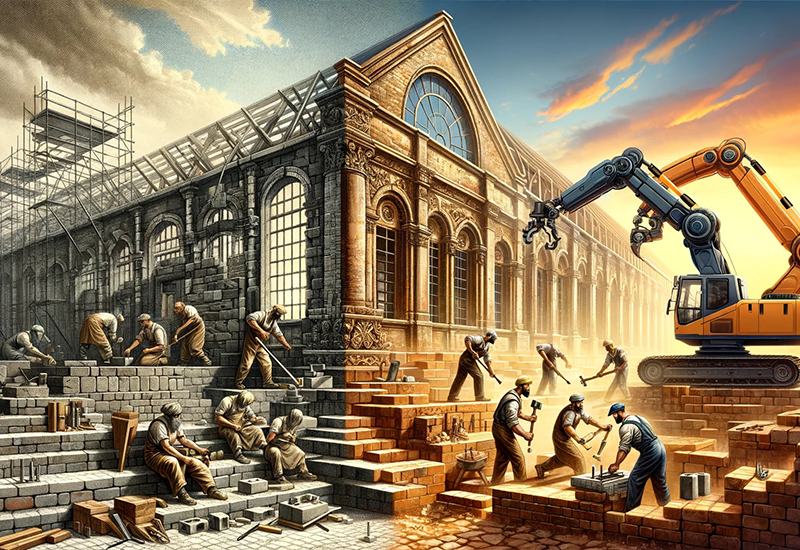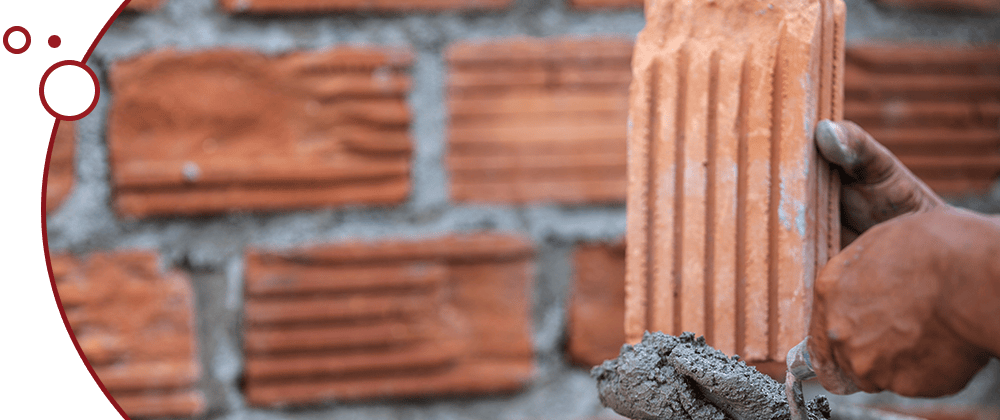
Who does masonry work? This question might seem straightforward, but the answer delves into a world of skilled artisans and professionals who play a critical role in building and maintaining the structural integrity of various constructions. Masonry, an age-old craft, involves working with materials like bricks, stones, and concrete blocks. In this article, we will explore the various professionals involved in masonry, the skills required, and the importance of their work in contemporary construction projects.
Table of Contents
Understanding Masonry and Its Importance
Masonry is more than just a construction technique; it’s a foundational craft that has shaped buildings and civilizations for centuries. This section explores the enduring relevance and critical importance of masonry in modern construction, linking directly to detailed discussions on its evolution and the key roles of professionals in the field.
What is Masonry?
Masonry work is all about creating lasting structures using various robust materials. This process involves the construction of buildings, walls, and other structures using individual units such as bricks, stones, or concrete blocks. These units are typically bound together with mortar, a mix that cements them into place, ensuring stability and strength. The durability and visual appeal of masonry have made it a favored choice for centuries, featuring prominently in both ancient and modern architectures. It’s not just about stacking bricks; it’s an art that requires precision and a deep understanding of materials and techniques.
Why is Masonry Significant?
So, why do we still lean on masonry in a world full of new building technologies? First off, masonry stands out for its incredible resilience and fire resistance, making it a go-to choice for safety-conscious construction. But there’s more to it than just being tough. Masonry plays a pivotal role in the sustainability of buildings. Its materials have a great capacity for thermal mass, helping regulate indoor temperatures and reducing the need for artificial heating and cooling. This characteristic significantly impacts energy conservation, making masonry a key player in green building strategies. Moreover, the aesthetic versatility of masonry, with various finishes and designs, allows architects to craft unique and beautiful buildings that stand the test of time.
The Professionals Behind Masonry Work
Masonry isn’t just about the materials; it’s fundamentally about the skilled professionals who work with them. Masons are highly trained artisans, specializing in the craft of building with materials like brick, stone, and concrete blocks. Each mason brings a unique skill set, whether laying the foundation of a home or crafting an intricate stone facade, they ensure each project is not only structurally sound but also aesthetically appealing. These professionals embody the rich tradition and innovation within the masonry field, shaping environments that last generations.
Roles and Responsibilities
Masons are essential in interpreting complex blueprints, accurately estimating the necessary materials, and adeptly laying bricks or stones to construct robust structures. Their precision ensures that every project adheres to the highest aesthetic standards and meets strict regulatory requirements. The meticulous attention to detail these professionals maintain guarantees that buildings are not only visually impressive but also structurally sound and compliant with all safety standards.
Types of Masonry Professionals
The field of masonry includes several specializations, each focusing on different materials and construction techniques:
- Brick Masons: These professionals specialize in using brick, mastering the techniques required to maximize both the durability and aesthetic appeal of their constructions.
- Stone Masons: Known for their ability to work with natural stone, these masons combine ancient craftsmanship with modern design to create stunning, enduring structures.
- Block Masons: Specializing in the use of concrete and cinder blocks, these masons handle everything from residential to commercial projects, focusing on cost-effectiveness and structural integrity.
This diverse group of masonry professionals brings a blend of skill, precision, and creativity to the construction industry, making masonry work a cornerstone of building and architectural design. Their roles and specializations underline the complexity and artistry involved in masonry, a field that is as much about technical skill as it is about aesthetic execution.
Required Skills for Masonry
Masonry demands a unique combination of technical know-how and physical resilience. Masons need to be well-versed in construction techniques and tools, and must have the strength and stamina to handle physically challenging tasks. Their role also requires precision, creativity, and problem-solving abilities, making it a skilled trade that depends on both physical and mental capabilities.
Technical Skills
Masons must possess a deep understanding of various construction techniques, which includes knowledge of tools and materials specific to masonry. Precision is paramount in their work, as accurate cutting and aligning of bricks, stones, or blocks are crucial for ensuring the structural integrity and aesthetic quality of the build. A mason’s ability to accurately measure and cut materials not only affects the durability but also the safety of the structure.
Physical and Mental Requirements
Masonry is a physically demanding profession requiring substantial strength and stamina. Masons often handle heavy materials and work in challenging positions, which necessitates good physical health and endurance. Beyond the physical aspects, masonry requires a sharp mind for meticulous attention to detail. Creativity and problem-solving skills are essential, as masons frequently need to adapt to varying construction scenarios and overcome unexpected challenges. This blend of physical resilience and mental agility makes the role of a mason both demanding and rewarding.
Training and Certification for Masons
Training and certification are pivotal for masons, shaping their ability to execute high-quality work. These programs equip masons with essential skills and validate their expertise, ensuring they meet industry standards and are recognized for their craftsmanship and professional integrity.
Educational Pathways
The journey to becoming a skilled mason typically begins with comprehensive training, which can vary widely from informal on-the-job experiences to structured apprenticeships. Many aspiring masons opt for apprenticeships that offer a blend of classroom-based technical instruction and practical, hands-on training under the guidance of experienced masons. This education not only covers the basics of masonry but also delves into complex building techniques, safety regulations, and specialized skills needed in modern construction. These programs ensure that trainees not only learn the trade but also understand the science and art behind masonry, preparing them to tackle various challenges in their future projects.
Certification
Achieving professional certification is a significant step for masons looking to advance their careers. These certifications are not just formalities; they are proof of a mason’s expertise and dedication to maintaining high standards of quality in their craft. Certified masons are recognized for their skills and knowledge, which can open up more opportunities for career advancement and higher-level projects. Moreover, certifications often require masons to stay updated. They must know the latest construction techniques and safety protocols. This ensures they are well-prepared to deliver excellent workmanship in a rapidly evolving industry.
The Evolution of Masonry Work

Masonry has dramatically evolved from its ancient roots to incorporate modern technology and materials. This evolution reflects changes in tools, techniques, and materials, enhancing both efficiency and sustainability in building practices.
Traditional vs. Modern Techniques
Masonry, a craft steeped in tradition, has undergone significant transformation over the years. While the core goal—creating durable structures—remains unchanged, the tools and methods used by masons have evolved considerably. Traditional techniques were heavily manual and time-intensive, relying on the skillful hands of masons to shape and place each element. In contrast, modern masonry embraces technological advancements, including the use of precision machinery and cutting-edge materials. These innovations enhance efficiency. They also significantly improve environmental sustainability. This is achieved by reducing waste and optimizing resource use. This blend of old and new allows today’s masons to maintain integrity. They uphold traditional masonry while meeting contemporary construction standards.
Traditional vs. Modern Masonry Techniques
| Aspect | Traditional Techniques | Modern Techniques |
| Tools Used | Hand tools like chisels, hammers | Automated machinery, laser-guided cutting tools |
| Materials | Natural stone, classic brick | Engineered stones, sustainable bricks |
| Construction Time | Longer due to manual processes | Reduced with automation and better planning tools |
| Skill Level | High skill in craftsmanship essential | Technical skills combined with machine operation |
| Environmental Impact | Less consideration for sustainability | High focus on reducing carbon footprint |
Future Trends in Masonry
Looking ahead, the field of masonry is poised for further innovation. Robotic masonry leverages robotics to lay bricks and stones. This advancement promises to revolutionize the industry. It improves precision and speeds up construction times. Additionally, the shift towards eco-friendly materials is gaining momentum. More masons and architects are choosing options that minimize environmental impact. These choices do not compromise on quality or aesthetics. These materials are not only better for the planet but also enhance durability and insulation properties. This makes them ideal for modern masonry. As these trends continue to evolve, they will shape the future of masonry. This evolution makes it more efficient, sustainable, and aligned with global sustainability goals.
Conclusion
As we have explored who does masonry work and the significant impact they have on building durable, aesthetic structures, it’s clear that professional expertise is key. If you are looking for a professional contractor for masonry work, ensure they have the right blend of skills and experience. For professional masonry services, you can contact us at +(1) 917-477-9667 to discuss your project needs.
FAQs
Q: What qualifications should I look for in someone who does masonry work?
A: When seeking a professional who does masonry work, it’s essential to consider several factors. Look at their experience, specific training in masonry, and any certifications they hold. These factors ensure they are well-equipped to handle the complexities of masonry construction.
Q: How long does it typically take for someone who does masonry work to complete a project?
A: The duration for someone who does masonry work to complete a project varies based on the scope and complexity. Typically, smaller projects might take a few days, while larger, more intricate constructions could require weeks or even months.
Q: What are the safety practices for someone who does masonry work?
A: Safety is paramount for someone who does masonry work. Professionals adhere to strict safety guidelines. They wear protective gear, secure the work area, and follow protocols. These measures ensure materials are handled safely and efficiently.
Q: Can someone who does masonry work customize designs?
A: Yes, someone who does masonry work can customize designs to match specific aesthetic or structural requirements. They work closely with clients to ensure the final product reflects the desired appearance and functionality.
Q: What maintenance is required by someone who does masonry work after project completion?
A: Post-completion, someone who does masonry work might advise on maintenance practices to preserve the structure’s integrity and appearance. This includes regular inspections, cleaning, and timely repairs of any wear or damage.


